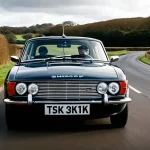Understanding Road Rage
Road rage is a growing concern on UK motorways, affecting not just drivers’ safety but also their psychological well-being. Generally defined as aggressive or angry behaviour by motorists, road rage can lead to dangerous driving scenarios and potential accidents. Its impact is far-reaching, as even mere encounters with aggressive drivers can significantly stress drivers who are otherwise calm.
Common triggers include being cut off, slow drivers in the fast lane, and heavy traffic conditions. These situations can evoke strong emotional responses, culminating in aggressive behaviour on the road. The psychological effects are noteworthy. Besides immediate anger or frustration, drivers can experience lingering stress and anxiety after encountering aggressive behaviour.
Also to see : Step-by-Step DIY Heated Grips Installation for Suzuki DR650: Ride Warm and Comfortable Year-Round!
Understanding the underpinnings of these reactions can aid in mitigating their effects. Recognizing the triggers is the first step towards controlling one’s response. Acknowledging that anger can stem from feeling endangered or disrespected allows for more informed emotional management. Reflecting on the reasons behind these reactions can guide drivers toward more constructive behaviour, prioritizing motorway safety and reducing the likelihood of road rage incidents.
Strategies to Maintain Composure
Navigating stressful driving situations demands effective techniques to ensure emotional control. Deep breathing is a powerful tool, helping to steady your nerves when overwhelmed. Counting each breath can anchor you in the present moment, easing anxiety. Mindfulness practices, such as focusing on the present without judgement, can also aid in staying calm.
In parallel : Revamp Your British SUV’s Boot: Innovative Customization Tips for Ultimate Storage Solutions
Positive self-talk is essential in maintaining composure. Affirmations like “I am a safe driver” or “I can handle this” reinforce inner confidence, allowing a sense of control over emotional responses. Role-playing potential aggressive encounters before they occur can prepare you mentally, diminishing their actual impact.
In moments of heightened stress, creating a personal mantra is beneficial. Simple phrases, like “Inhale peace, exhale tension,” can help recenter your thoughts, allowing for a swift return to calmness. Repeating this mantra can interrupt the cycle of anger, turning attention away from the aggressive drivers.
By employing these techniques, drivers can prioritise stress management, thereby enhancing personal well-being and contributing to motorway safety. These strategies not only promote a peaceful mindset but can also diminish the likelihood of road rage incidents.
Legal Insights on Aggressive Driving
Understanding UK traffic laws is crucial when dealing with aggressive driving. The UK has specific regulations addressing dangerous and aggressive behaviour on the roads, defining offences such as careless and inconsiderate driving. Offenders may face fines, penalty points, or even disqualification from driving.
When encountering aggressive behaviour, it is vital to know how to report aggressive driving behaviour. Drivers can report incidents to the local police force, providing details like the vehicle registration number, time, and location of the event. Having this information strengthens the report and aids authorities in taking necessary action.
Reporting is not just about addressing immediate situations but also about protecting oneself legally. It’s important for drivers to safeguard themselves using dashcam footage or witnesses if available. Such evidence can be pivotal if legal proceedings are necessary.
Understanding the legal consequences for aggressive drivers can deter potential offenders. Penalties range from fines and points on the driving licence to imprisonment for severe cases. Raising awareness of these consequences is a preventive measure, promoting a safe and respectful driving environment for all road users.
Safe Driving Techniques
Adopting defensive driving strategies is essential to maintain safety and reduce confrontation on the road. By practicing motorway etiquette, drivers can navigate traffic more smoothly and minimize risks. One fundamental approach is to maintain a safe following distance, allowing ample time to react to sudden stops or movements from other vehicles. This not only prevents collisions but also reduces the likelihood of aggressive responses from other drivers.
Another vital technique is avoiding aggressive maneuvers. Refraining from rapid lane changes or tailgating can prevent road-borne disagreements. Equally important is the practice of consistent signaling and ensuring predictability in your actions, enhancing overall traffic flow and preventing confusion for other motorists.
Implementing these methods not only enhances your driving safety but also contributes to a more harmonious motorway environment. Moreover, reinforcing these practices consistently fosters a sense of responsibility and aids in maintaining composure amidst potential provocations, further safeguarding motorway safety. By taking these thoughtful steps, drivers can cultivate an environment of respect and caution, bolstering both their own safety and that of others on the road.
De-escalation Techniques
Navigating encounters with aggressive drivers can be challenging. A critical element in managing these situations is recognizing the body language and emotional signals of other drivers before the situation escalates. Look for signs such as tight grips on the steering wheel, visible yelling, or erratic vehicle movements, as these may indicate heightened emotions.
When faced with potential conflict, it’s essential to engage in effective conflict resolution. Respond calmly, maintaining a neutral stance to de-escalate tension. Avoid direct eye contact, which might be perceived as a challenge, and instead focus on staying calm and collected.
De-escalation can also be approached with light-hearted strategies. Occasionally, using a touch of humour or making a positive gesture, like a courteous wave, can defuse tension and signal your non-confrontational intentions. These strategies are resourceful tools to transform aggressive scenarios into manageable encounters, promoting motorway safety.
Fostering these skills not only aids personal safety but encourages a safer driving environment for all road users. Employing these tactics ensures a mindful approach to managing and reducing road rage incidents effectively.
Resources and Support
In the realm of road rage and aggressive driving, accessing the right support resources can make a significant difference. UK organizations, such as the National Road Safety Foundation, offer support resources to help individuals manage stress and improve their driving habits. Their materials are designed to increase awareness and provide strategies on how to navigate stressful motorway situations effectively.
Attending driving workshops is a proactive step drivers can take to enhance their skills and confidence. These courses often focus on improving defensive driving techniques, understanding motorway etiquette, and coping with aggressive scenarios. Engaging in such workshops can empower drivers, equipping them with the necessary tools to manage their emotions and reactions on the road.
Mental health support is another crucial avenue, especially for those struggling with anxiety or stress related to driving. Services like cognitive behavioural therapy (CBT) can provide coping mechanisms to address the psychological impact of dealing with aggressive drivers. Accessing mental health support not only aids in personal well-being but also contributes to safer motorway safety for all users. Enlisting these resources can turn challenging driving experiences into opportunities for personal growth and confidence-building.


